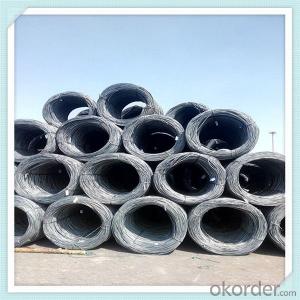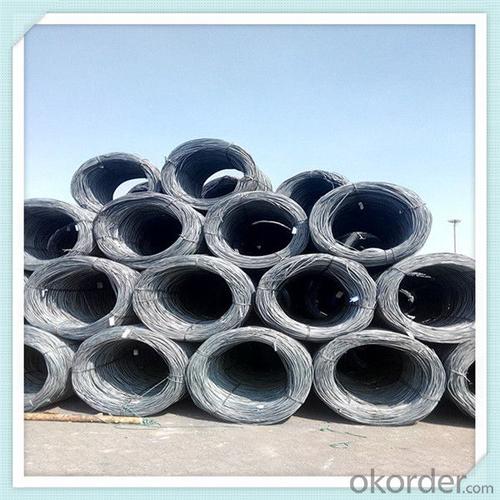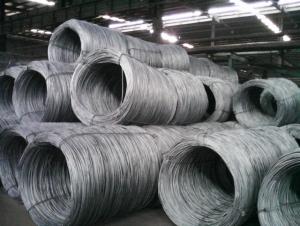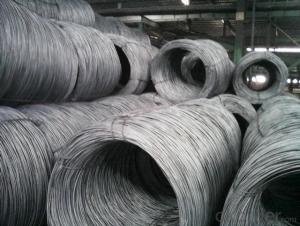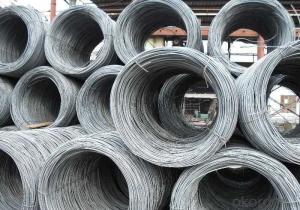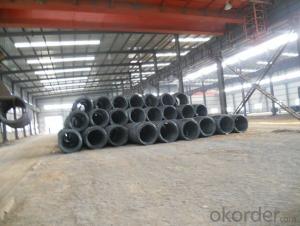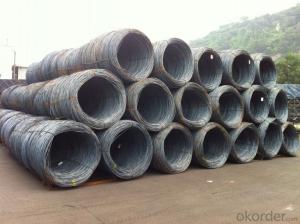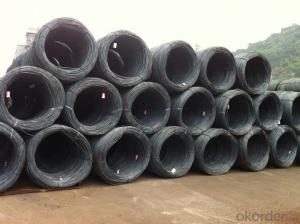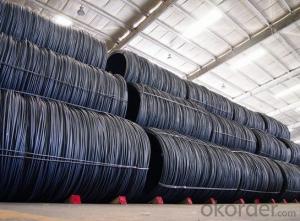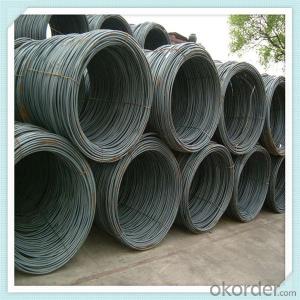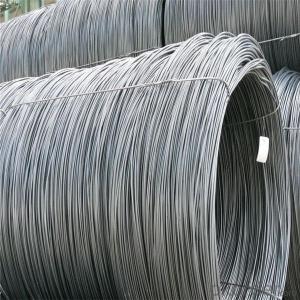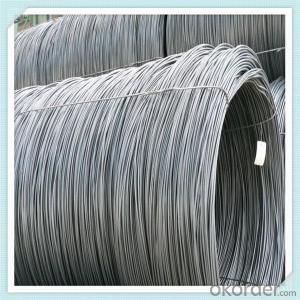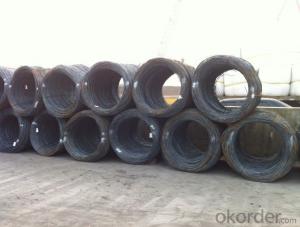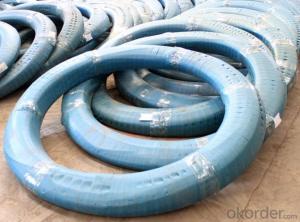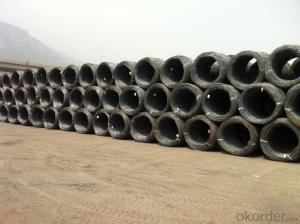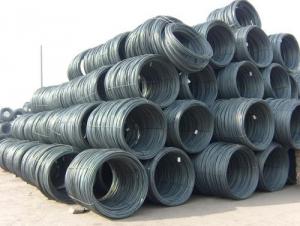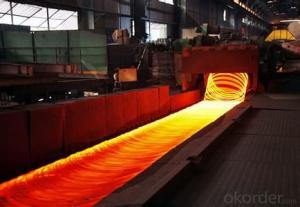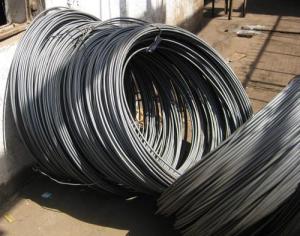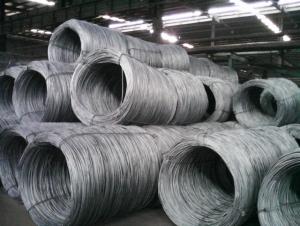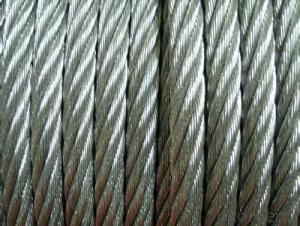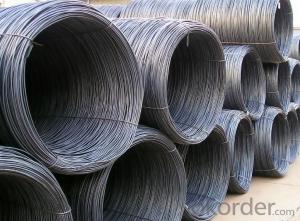SAE1006 carbon steel wire rod in cheap factory price
- Loading Port:
- China main port
- Payment Terms:
- TT OR LC
- Min Order Qty:
- 100 m.t.
- Supply Capability:
- 12981 m.t./month
OKorder Service Pledge
OKorder Financial Service
You Might Also Like
Specification
Our Advantage:
High quality steel products from 1 class mills in
Reasonable price
Professionalism of the products
On-time delivery
Complete documents and certificates
Sincere service to meet our clients' requirements
Features
1、Pure steel quality, stable chemical contents, small tolerance.
2、Constant Quality, good drawing performance.
3、High dimension accuracy degree, accuracy degree of Level C up to 80%, smooth surface, less scale,
easy to be pickled.
4、Automatic bundling with 4 lines by Machine in tidy and good looks
5、Big high quality percentage, small coil percentage, and heavy coil weight for Hard Coil.
6、High sorbitizing percentage.
Product Description :
Standard | AISI, ASTM, BS, DIN, GB, JIS |
Material/steel grade | Q195-Q235,SAE1006B,SAE1006CR, SAE1008B, SAE1008CR, SAE1010B, SAE1018B, or according to customers requirements |
Wire Gauge | 5.5-12mm |
Coil weight | 1.8-2.1mts |
MOQ | 25MT |
Delivery Time | 15-30 days after receipt of L/C or deposit by T/T |
Packing | In coil and load in container, if large quantity, by bulk vessel; Can be packed as customers' special requirements |
Payment terms | 1).100% irrevocable L/C at sight. 2).30% T/T prepaid and the balance against the copy of B/L. 3).30% T/T prepaid and the balance against L/C |
Application | widely used in machinery parts, manufacturing industry, electronics industry, metal tools and others |
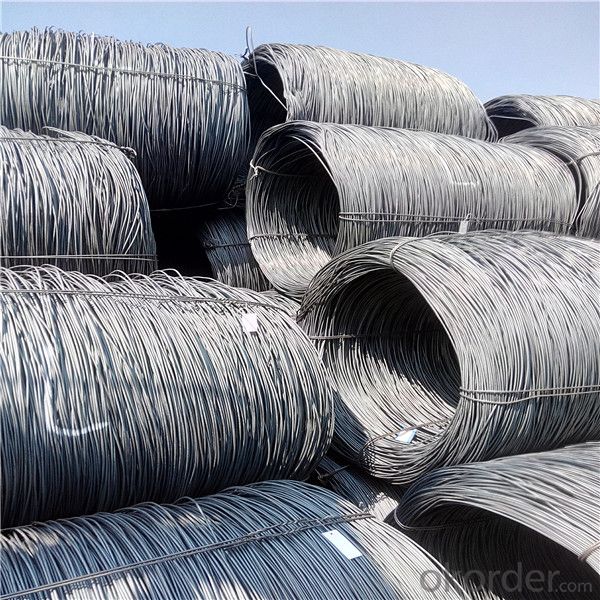
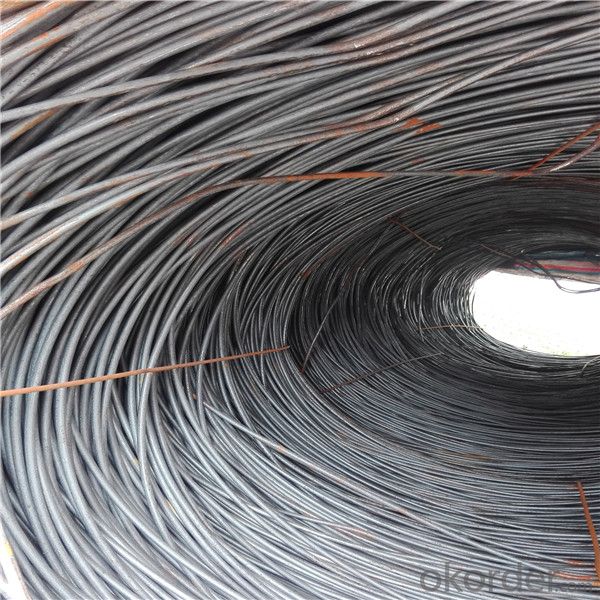
Application :
It generally used in braiding the hose for bathing product and machinery. With it
good flexibility, resistant to high temperature and resistant to corrosion, it
used widely in many industries.
Packing :
Hot-rolled wire rod is held in a unit with at least four steel straps in the
transverse direction and transported and stored without further packaging.
Before
the steel strapping is applied, the wire rod must be sufficiently compressed.
The strapping is fixed in the transverse direction with a single circumferential
strap so that the strapping does not slip and cause the coil to come apart.
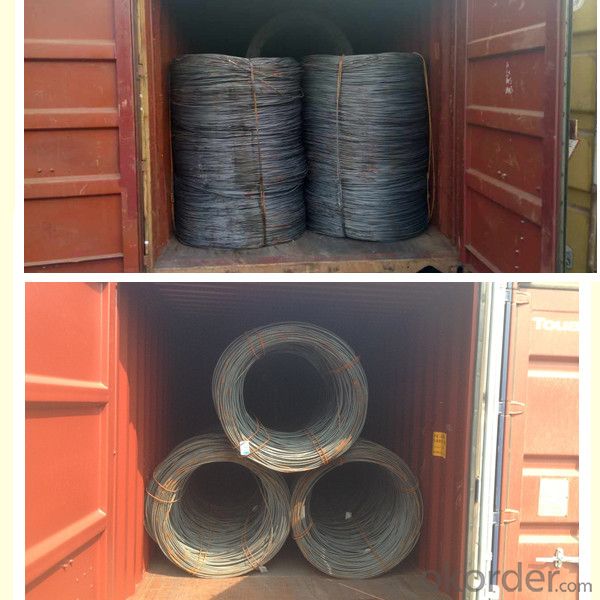
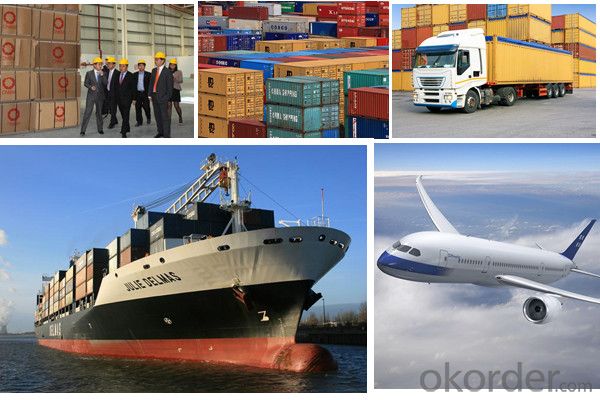
Our service:
(1) We cooperate with famous factories with advanced equipment and well trained workers.
(2) We can provide factory price with trading company service.
(3) We continuously work on the improvement of our processes, guaranteeing
consistently high standards of quality to keep none compensation.
(4) We guarantee 24 hours response and 48 hours solution providing service.
(5) We accept small order quantity before formal cooperation.
(6) We deliver the agreed quality at the agreed time, reacting to changes in
customer wishes in a flexible way.
(7) Due to our volume and selling power, we have excellent freight rates with
shipping lines.
(8) We strive to always be fair and honest in our dealings with customers.
(9) We strive to work together with customers to achieve much more than we can
achieve alone.
(10) Through our passion and commitment we aim to be a market leader in all our
key markets. To maintain our position as market leader we must continue to add
value in all that we do.
FAQ:
1.Q: What's your MOQ(minimum order quantity)?
A: One full container, mixed acceptable .
2. Q: What's your packing methods?
A: Packed in bundle or bulk ..
3. Q: How can I buy CNBM products in my country?
A:Please send us an inquiry or email ,we will reply to you if there is distributor in your country
4. Q: Can we visit your factory?
A: Warmly welcome. Once we have your schedule, we will arrange the
professional sales team to follow up your case.
5. Q: How long does it take to get the product if i place an order?
A:With the process of your requirements,we will pack and deliver in 3
-7 days. If it is by sea shipment,it will take 15-45 days depending on different locations
- Q: How is steel wire rod used in the manufacturing of wire rope grips?
- Steel wire rod is a crucial component in the manufacturing of wire rope grips due to its strength and durability. Wire rope grips are used to secure and fasten the ends of wire ropes together, providing a secure connection that can withstand high tension and loads. During the manufacturing process, steel wire rod is first drawn through a series of dies to shape it into the desired diameter and smoothness. This process ensures that the wire rod has the necessary strength and flexibility to withstand the demanding conditions that wire rope grips will be subjected to. Once the steel wire rod has been drawn and shaped, it is further processed to create the wire rope grips. The rod is cut to the required length and then formed into a U-shape, creating a loop that will hold the wire rope securely. The ends of the wire rod are threaded, allowing for easy tightening and loosening of the grip. The steel wire rod used in the manufacturing of wire rope grips is typically made from high-quality carbon steel, which has excellent strength and resistance to corrosion. This ensures that the wire rope grips can withstand heavy loads and harsh environmental conditions without compromising their integrity. In summary, steel wire rod is used in the manufacturing of wire rope grips to provide the necessary strength, durability, and flexibility required to secure and fasten wire ropes together. Its high-quality carbon steel composition ensures that the grips can withstand demanding conditions and maintain their integrity throughout their lifespan.
- Q: What are the different types of wire ropes for cranes made from steel wire rod?
- There are several types of wire ropes for cranes that are made from steel wire rod. Some common types include galvanized wire ropes, stainless steel wire ropes, and non-rotating wire ropes. Each type has its own unique properties and is used for specific crane applications.
- Q: What are the common production processes for platinum-coated steel wire rod?
- The common production processes for platinum-coated steel wire rod typically involve wire drawing, cleaning, coating, and annealing. The steel wire rod is first drawn through a series of dies to reduce its diameter and improve its mechanical properties. Then, the wire is thoroughly cleaned to remove any impurities or contaminants. After cleaning, a thin layer of platinum is applied to the surface of the wire through a coating process, which can be electroplating or physical vapor deposition. Finally, the platinum-coated wire rod undergoes annealing, a heat treatment process that helps to enhance its strength, flexibility, and other desired properties.
- Q: What are the different types of steel wire rod coatings used for increased corrosion resistance?
- There are several types of steel wire rod coatings that are commonly used to enhance corrosion resistance. These coatings are applied to the surface of the wire rod to protect it from environmental factors that can lead to corrosion. Some of the different types of coatings used for increased corrosion resistance include: 1. Zinc Coating: Zinc coatings, such as hot-dip galvanizing, are widely used to provide corrosion resistance to steel wire rods. The zinc coating acts as a barrier between the steel and the surrounding environment, preventing the oxidation of the underlying metal. 2. Aluminum Coating: Aluminum coatings are also commonly used to increase the corrosion resistance of steel wire rods. These coatings create a protective oxide layer on the surface of the wire, preventing the formation of rust and other forms of corrosion. 3. Polymer Coating: Polymer coatings, such as epoxy or polyurethane, are applied to steel wire rods to provide a protective barrier against corrosion. These coatings are known for their excellent resistance to moisture, chemicals, and abrasion, making them suitable for applications where the wire is exposed to harsh environments. 4. Phosphate Coating: Phosphate coatings are often used as a pretreatment before applying other protective coatings. These coatings improve the adhesion of subsequent coatings and provide additional corrosion resistance. 5. Chromate Conversion Coating: Chromate conversion coatings are applied to steel wire rods to enhance their corrosion resistance. These coatings form a thin layer of chromium oxide on the surface of the wire, which acts as a barrier against corrosion. It is important to note that the selection of the appropriate coating depends on various factors, including the specific application, environmental conditions, and desired level of corrosion resistance.
- Q: How does the dimensional accuracy of steel wire rod vary with different heat treatment processes?
- The dimensional accuracy of steel wire rod can vary with different heat treatment processes. Heat treatment processes, such as annealing or quenching and tempering, can affect the microstructure and mechanical properties of the steel wire rod. The dimensional accuracy can be influenced by factors like the cooling rate, the temperature and duration of the heat treatment, and the composition of the steel. Generally, controlled heat treatments can help improve the dimensional accuracy of the steel wire rod by reducing internal stresses and ensuring uniformity in the material.
- Q: What are the common production processes for titanium-coated steel wire rod?
- The common production processes for titanium-coated steel wire rod typically involve cleaning the steel wire rod to remove any dirt or impurities, followed by a coating process where a layer of titanium is applied onto the surface of the steel wire rod using techniques such as electroplating or physical vapor deposition. After the coating process, the titanium-coated steel wire rod may undergo further processes such as drying, curing, and quality control checks before it is ready for use in various applications.
- Q: What are the main factors influencing the choice of steel wire rod end-user?
- The main factors influencing the choice of steel wire rod end-user include the specific application requirements, such as tensile strength, corrosion resistance, and durability. Other factors include price, availability, and the reputation and reliability of the supplier.
- Q: How are steel wire rods used in the production of wire ropes for elevators?
- Wire ropes for elevators require steel wire rods as a vital component. These rods are transformed into wire strands, which are then twisted together to create the wire ropes. To begin the process, steel wire rods are carefully chosen for their strength and durability. They then undergo a series of machines that draw them to the desired diameter and shape. This drawing process involves pulling the rods through dies, gradually reducing their size and increasing their length. Once the desired wire strand size is achieved, multiple strands are tightly twisted together to form a wire rope. The number of strands used and the twist direction can vary depending on elevator requirements. This twisting process is crucial as it provides the wire rope with strength, flexibility, and the ability to bear heavy loads. The steel wire rods' high tensile strength and resistance to wear and corrosion make them ideal for wire rope production. Additionally, their consistent quality ensures that the resulting wire ropes can withstand the demanding conditions in elevator applications. Overall, steel wire rods are indispensable in producing reliable and durable wire ropes for elevators. Their unique properties and versatility make them an excellent choice for constructing safe and efficient elevator operations.
- Q: How is the surface quality of steel wire rod evaluated?
- Various methods and criteria are utilized to assess the surface quality of steel wire rod, ensuring its appropriateness for diverse applications. Among these methods, visual inspection stands as a common approach, wherein trained inspectors visually scrutinize the wire rod's surface for any flaws or irregularities. This encompasses the examination of surface cracks, pits, spots, or any other observable imperfections. In addition to visual inspection, non-destructive testing techniques serve as viable means to evaluate surface quality. One such technique is magnetic particle inspection, which entails the application of a magnetic field to the wire rod, along with the administration of fine iron particles onto the surface. Any surface defects or cracks disrupt the magnetic field, causing the iron particles to accumulate and thus making the flaws discernible. Ultrasonic testing represents an alternative non-destructive method employed to assess the surface quality of steel wire rod. By transmitting high-frequency sound waves into the wire rod, any reflections or alterations in the sound waves indicate the presence of defects or irregularities on the surface. Furthermore, the surface quality can be gauged through the measurement of specific physical properties of the wire rod. For instance, the roughness of the surface can be quantified using instruments such as a profilometer, which provides a numerical value denoting the smoothness or roughness of the surface. This becomes significant, as certain applications necessitate a specific level of surface roughness to optimize performance. In essence, the evaluation of the surface quality of steel wire rod encompasses a combination of visual inspection, non-destructive testing techniques, and physical property measurements. By employing these evaluation methods, manufacturers ensure that the wire rod adheres to the required standards and is suitable for its intended purpose.
- Q: What are the national standards for steel wire rod?
- The national standards for steel wire rod vary from country to country. Each country typically has its own set of standards governing the composition, quality, and production of steel wire rod. These standards ensure that the wire rod meets the necessary requirements for strength, durability, and performance in various applications. It is important for manufacturers and consumers to adhere to these standards to ensure the safe and reliable use of steel wire rod in different industries.
Send your message to us
SAE1006 carbon steel wire rod in cheap factory price
- Loading Port:
- China main port
- Payment Terms:
- TT OR LC
- Min Order Qty:
- 100 m.t.
- Supply Capability:
- 12981 m.t./month
OKorder Service Pledge
OKorder Financial Service
Similar products
Hot products
Hot Searches
Related keywords
